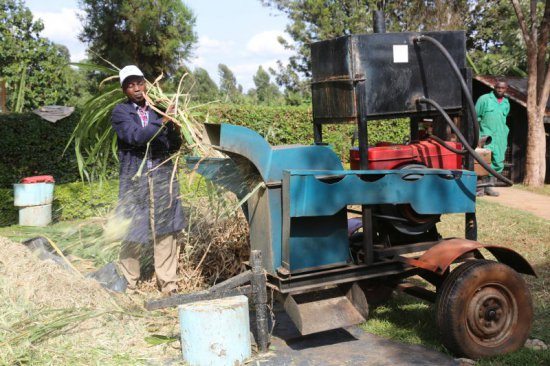What do you do when you find yourself out of employment all of a sudden? You could start a business, look for another job or retire and enjoy your pension. But what if you are a politician and fail to recapture your seat?
For one former MP, failing to recapture his seat in the 2013 general election gave him the opportunity to dedicate most of his time to his passion – farming.
Well, this former MP is Silas Muriuki who represented Imenti North. Meet him at his dairy farm near the Kenya Methodist University off the Meru-Maua highway.
Mr Muriuki is busy chopping hay for his 14 dairy cows, which he says produce 150 litres of milk daily. Besides the Fresian dairy cows, the proud farmer has five bull calves. He devotes all his energies tending to them.
“I plan to sell the bulls, because I want only dairy cows,” he says. He only rears the calves to maturity before selling them.
His prized asset is Joy, the cow that gives him at least 27 litres of milk every day. Two others, Karendi and Mwiru, also produce more than 25 litres each daily.
The former legislator attributes his passion for dairy farming to a trip he made to Israel in 1981, which he says opened his eyes to the potential of keeping cows for milk. Then, he was the Kenya National Union of Teachers (KNUT) secretary in Meru.
Eye-opening visit
‘’I saw a cow produce 60 litres of milk daily and was awed. I came back with a passion and dreamt to become a successful dairy farmer. In 1985, I had five dairy cows that were producing 70 litres daily. I was the Meru Knut secretary and this prevented me from concentrating on my cows, hence the little daily yield,” he says.
In 2007, Muriuki left KNUT to venture into politics, capturing the Imenti North in that year’s elections. But it is when he failed to recapture the seat in 2013 that he decided to concentrate his energies on his cows. He is now reaping the fruits of his hard work.
A few weeks ago, he installed a cooler in his farm as his cows are producing large amounts of milk. He sells his milk to a local co-operative society and retail shops around his home and the nearby Meru town.
“The cooler can keep 300 litres of milk for 72 hours before I take it to the Kithoka Dairy Farmers Cooperative,” he says.
To ensure his cows are healthy, the former legislator says he feeds them with maize silage from his own farm.
“I also feed them with nappier grass, lucerne and barley straws from another of his farms,” he says. “In the 1980s I used to feed them with only nappier grass and water, and that is why they produced so little milk. Now, I have to complement their diet with Rhodes, which I buy from nearby Marimba and Timau.”
Muriuki also buys dairy supplements for his beloved herd. “It is mandatory to provide mineral supplements for your herd. I buy Vital Maziwa which I mix with dairy meal. I also give them molasses,” he reveals.
To cut on costs, Muriuki bought a chopper, a machine that crushes grass into a mixture that cows can easily feed on.
For maximum milk production, he ensures the feeding, sleeping and milking quarters are in their best conditions for the comfort of his cows. The cow shed is paved with white tiles which are scrapped several times every day.
‘Massage parlour’
“Animals like cleanliness. Their sleeping quarters have mattresses for their comfort. The feeding area is spacious. The milking parlour and milking machines are kept very clean. The machines reduce violence in cows because they are soothing. It’s like a massage parlour,” Muriuki told Smart Harvest.
The sheds are connected with electricity to ensure the area is well lit round the clock.
“I spared no expense because I wanted my production to be optimum. The dairy farm’s structure and equipment took Sh3.9 million, but the income from milk sales is paying off,” he said.
Of these, both the milk cooler and milk machines cost Sh400,000 each while the automatic generator took another Sh300,000.
Two of his most reliable customers are the Gatimene Gardens Hotel and Status Hotel in Meru town, both of which he supplies 50 litres of milk daily.
In partnership with other dairy farmers, Muriuki opened the Meslopes, an animal feeds mill for fish, livestock, poultry and other types of farming.
His wish is that milk will soon fetch better prices so small scale farmers can benefit.
“Most farmers earn Sh50 from a litre of milk. That’s very low considering the inputs. The big societies sell the milk to supermarkets at Sh80 to Sh90,” said Muriuki.









